I want to start with a question: Have you ever considered eating microalgae? It’s not exactly a mainstay food in Western culture, and frankly, it doesn’t sound too appealing either. But you’ve likely seen it growing in fish tanks and you’ve probably eaten its seaweed big brother.
Shocker, right? Seaweed is a type of algae, so it’s likely that algae itself is no stranger to your diet. So, have you ever considered eating microalgae?
Picture this: air-conditioned, fully automated skyscraper pond farms growing green scum to be turned into cheap hamburgers and pasta. While hardly imaginable today, such could have been a reality some 70 years ago. For about a decade following World War II, the food industry was actually quite interested in algae as a means to solve the food crisis of an ever-growing population [1].
In particular, they were interested in chlorella, a protein-rich freshwater microalgae that grew rapidly with nothing more than sunlight and carbon dioxide. Now, as you can probably guess from the lack of chlorella burgers lining supermarket shelves, advances in traditional agriculture ultimately averted the hunger disaster.
I think that was a mistake.
Chlorella is roughly 2.5 billion years old, belonging to some of the first single-celled organisms to habitate our planet. In order to survive and replicate over that inconceivable span of time, this little algae needed to equip itself with some impressive defenses to protect against famine, drought, radiation, and poisoning.
It’s developed an impressive array of carotenoids, antioxidants, and enzymes to create energy, minimize oxidative stress, and neutralize toxicants, all housed within a fibrous armor shell. The reason ditching chlorella burgers was such a huge mistake is because it passes on many of these defenses to us after we eat it [2]. And it does so with relatively small doses.
Chlorella Improves Antioxidant Defenses
First and foremost, chlorella is a potent antioxidant, and several studies have found that supplementation is able to increase not just our antioxidant levels, but our antioxidant enzyme activity.
For example, let’s say you were a smoker, someone puffing on more than 20 cigarettes per day, which I think we can agree would lead to systemic oxidative stress. Supplementing with just 3.6 grams of chlorella for six weeks has been shown to increase every single tested marker of antioxidant status in these smokers while cutting levels of oxidative stress by 20% [3].
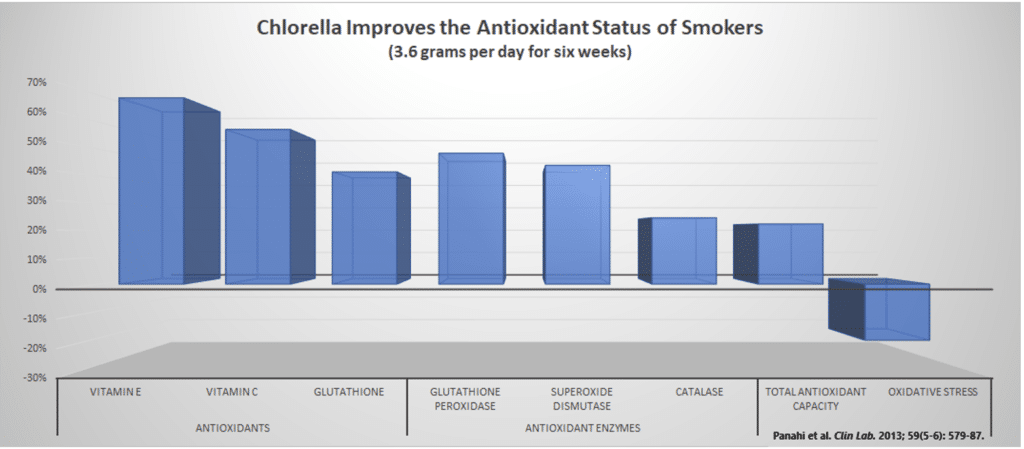
The ability of chlorella to improve one’s antioxidant status has been shown in other studies as well, another in smokers using 6.3 grams per day [4], and one in patients with chronic obstructive pulmonary disease (COPD) using just 2.7 grams per day [5].
In other words, if your body is taking an oxidative beating from your lifestyle or disease state, then chlorella could help counter the damage and keep everything running smoothly.
Chlorella Improves Cardiometabolic Health
Now, reductions in systemic oxidative stress can benefit health in a variety of ways, with one of the best-known being improvements in cardiometabolic health. And that’s exactly what we see with chlorella supplementation.
A meta-analysis of 19 randomized controlled trials reported that supplementing with an average of just 4 grams per day of chlorella significantly reduced LDL-C, blood pressure, and fasting blood glucose after an average of 2 months [6].
When the researchers dug into their data a little more, they found that the benefits were greatest in those who had some form of metabolic dysfunction and when the dose was greater than 4 grams per day, both of which are somewhat expected findings. It makes sense that those who are more unhealthy to begin with experience greater health benefits.
Now, that isn’t to say healthy folks won’t benefit. When we look at markers outside of traditional risk factors, supplementation with 6 grams of chlorella has been shown to reduce arterial stiffness in both younger and older adults who are otherwise healthy [7,8]. The researchers linked this improvement in vascular function to elevated levels of nitric oxide after supplementation.
Chlorella Helps You Detox
The body has a pretty amazing detoxification system set up that’s a concerted effort between the liver, kidneys, and intestinal tract. But sometimes, this system isn’t enough to rid the body of all the poisons it may hold, like heavy metals and certain pesticides.
Take mercury as an example. It’s a heavy metal that accumulates up the food chain, with some of the richest sources being predator fish like tuna or swordfish. When we eat a lot of foods high in mercury, we accumulate it too. Yet, supplementing with 9 grams of chlorella daily is able to reduce hair and blood concentrations of mercury after three months [9].
Or how about dioxins, which are pesticide toxicants linked to teratogenicity, carcinogenicity, infertility, immunosuppression, and thyroid dysfunction. They can also impact the neurological development of babies if pregnant mothers are exposed, so it’s entirely relevant that a group of researchers from Japan investigated how chlorella impacted its detoxification [10].
The researchers recruited healthy pregnant women in their second trimester and had them supplement with 6 grams of chlorella daily over six months. After giving birth, the researchers sampled their breast milk for dioxin concentrations, which is an established route of early-life dioxin exposure to babies.
Expectedly, there was a significant relationship between blood and breast milk concentrations of dioxins. It makes sense, right? More dioxins in your blood means more that sneak their way into breast milk. Compared to a group of women that didn’t take chlorella, supplementation was associated with 45% less dioxins and 42% less toxicity equivalent units in breast milk. Both were also lower in their blood.
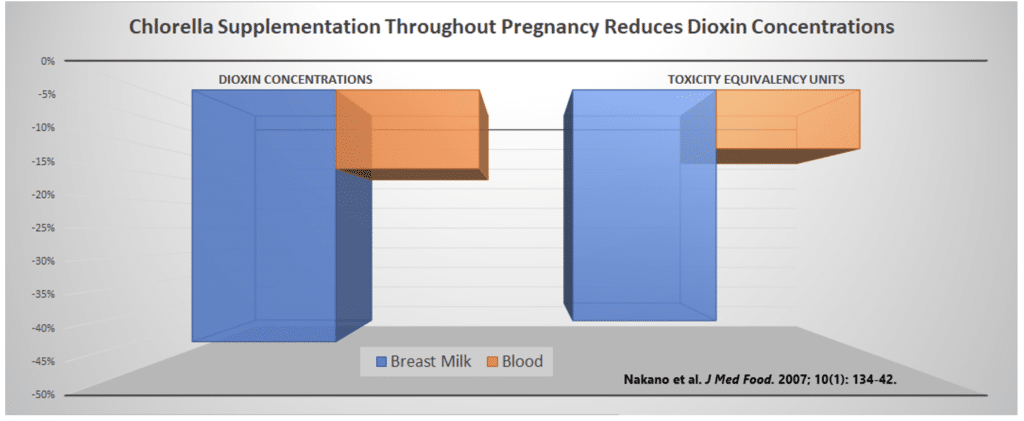
Chlorella Enhances Immune Function
There’s also some evidence that chlorella contracts with our body’s military forces to enhance functionality and ultimately increase immunity.
For example, some of the most important innate immune soldiers in our body are natural killer (NK) cells, which act like a security force patrolling the body and taking out cells they deem to be cancerous or infected by pathogens like viruses. Compared to a placebo, supplementing with 5 grams of chlorella daily over eight weeks more than doubled NK cell activity [11].
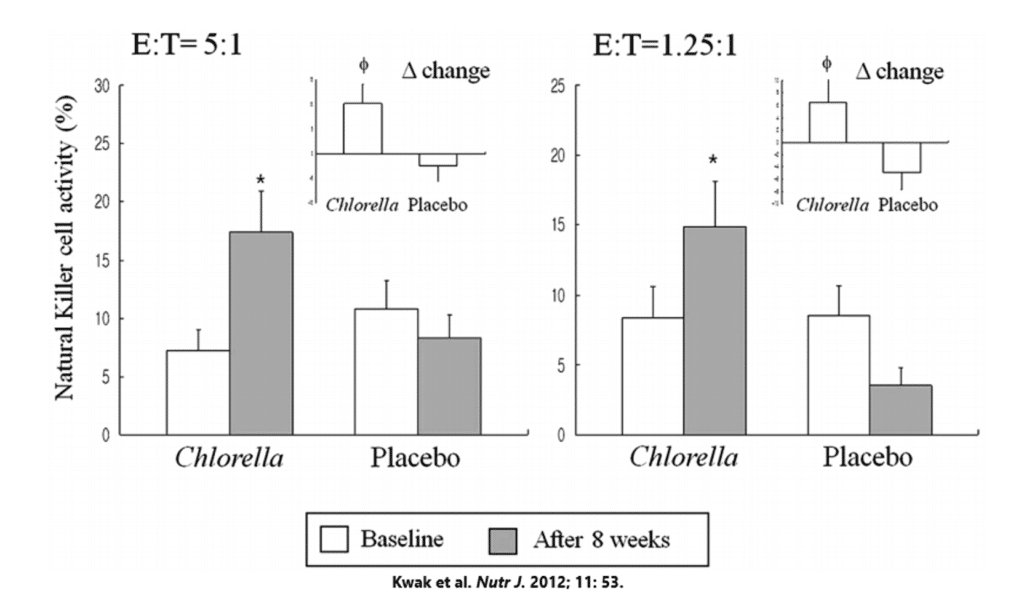
Similarly, immunoglobulin A (IgA) is an antibody that plays a critical role in mucosal defenses. Your mouth, intestinal tract, and lungs are all examples of areas where pathogens can enter the body through mucosal barriers and where IgA is necessary to prevent them from doing so.
In particular, we secrete large amounts of it in our saliva given the magnitude of environmental exposure our mouth has. Supplementing with 6 grams of chlorella daily for a month has been shown to increase salivary IgA concentrations and secretion rate by 40–50% compared to a placebo [12].
This ability to increase IgA concentrations extends to athletes as well, where intense training sessions are well-established to reduce IgA concentrations and predispose one to infectious diseases, particularly respiratory tract infections. Two separate studies have reported that supplementing with 5–6 grams of chlorella daily for a month before undergoing an intensive 2–5 day training period negates the natural exercise-induced decline in IgA concentrations [13,14].
Lastly, there’s data supporting an antiviral effect of chlorella. In adults with chronic hepatitis C infection of the liver, supplementing with 1.5 grams of chlorella daily over three months significantly lowered liver enzymes by 20% and tended to reduce the hepatitis viral load by 10% [15]. As a bonus, roughly 75% of the participants reported improvements in energy levels.
Chlorella Improves Physical Function
The previously reported increase in energy levels in those with hepatitis C infections is likely to come at least in part from the reduction in viral load. However, there’s evidence to suggest that chlorella may increase energy levels in other ways as well.
For example, in young men, supplementing with 6 grams of chlorella daily for one month increased VO2max by about 7% [16,17]. This is a measurement of the maximal amount of oxygen that a person can utilize during intense exercise and is an established marker of one’s aerobic fitness.
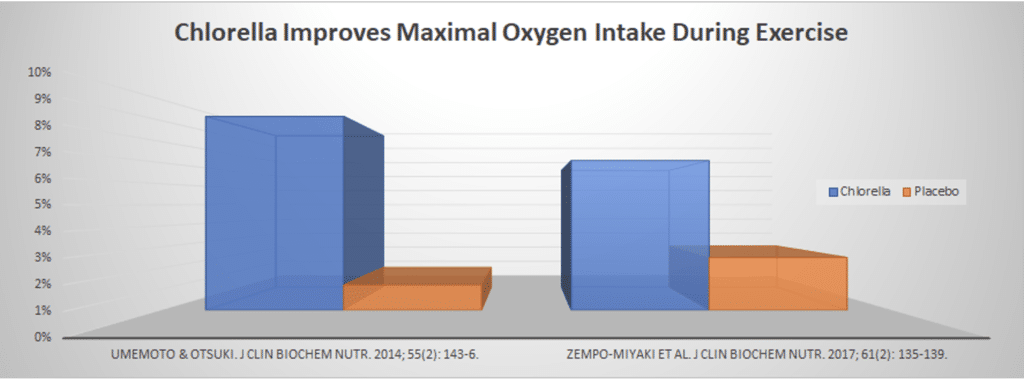
And this plays out in people struggling with chronic fatigue too. In adults with fibromyalgia, supplementing with 10 grams of chlorella plus a liquid chlorella extract daily for two months significantly reduced the number of tender muscle points by 8% and pain intensity by 22% [18]. The participants also reported improvements in most of their fibromyalgia symptoms, like general wellbeing and ability to be active.
When the researchers conducted a follow-up study comparing chlorella to a placebo, they saw largely similar results — reductions in the number of tender points and pain severity, along with a 20% reduction in fibromyalgia symptoms [19].
Summary
Chlorella is a freshwater microalgae that was once thought to be a solution to world hunger, but is now found only in the corners of natural health stores. Where it truly belongs, however, is on your supplement shelf.
Chlorella contains an impressive array of carotenoids, antioxidants, and enzymes that ultimately increases our antioxidant defenses, reduces oxidative stress, improves cardiometabolic health, helps with detoxification, enhances immune function, and improves physical function.
The science overwhelmingly shows that chlorella is a powerful antioxidant that improves numerous aspects of health and wellbeing. That’s why we’ve made it one of the cornerstone ingredients of our health-boosting multivitamin superfood formula, Energy Essentials and Superfoods.
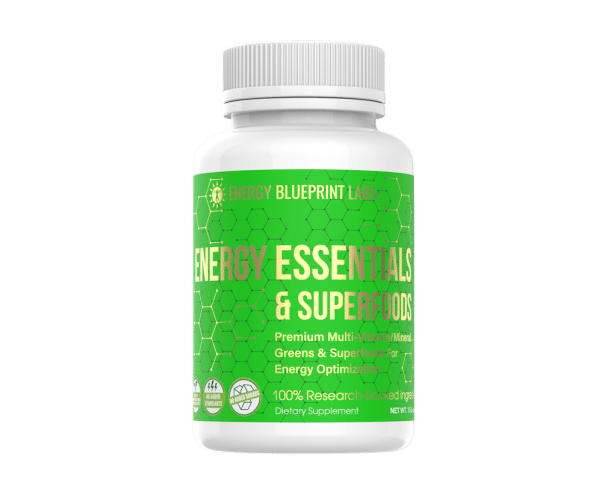
References
- Belasco W. Algae Burgers for a Hungry World? The Rise and Fall of Chlorella Cuisine. Technol Cult. [The Johns Hopkins University Press, Society for the History of Technology]; 1997;38:608–34.
- Bito T, Okumura E, Fujishima M, Watanabe F. Potential of Chlorella as a Dietary Supplement to Promote Human Health. Nutrients [Internet]. 2020;12. Available from: http://dx.doi.org/10.3390/nu12092524
- Panahi Y, Mostafazadeh B, Abrishami A, Saadat A, Beiraghdar F, Tavana S, et al. Investigation of the effects of Chlorella vulgaris supplementation on the modulation of oxidative stress in apparently healthy smokers. Clin Lab. 2013;59:579–87.
- Lee SH, Kang HJ, Lee H-J, Kang M-H, Park YK. Six-week supplementation with Chlorella has favorable impact on antioxidant status in Korean male smokers. Nutrition. 2010;26:175–83.
- Panahi Y, Tavana S, Sahebkar A, Masoudi H, Madanchi N. Impact of Adjunctive Therapy with Chlorellav ulgaris Extract on Antioxidant Status, Pulmonary Function, and Clinical Symptoms of Patients with Obstructive Pulmonary Diseases. Sci Pharm. 2012;80:719–30
- Fallah AA, Sarmast E, Habibian Dehkordi S, Engardeh J, Mahmoodnia L, Khaledifar A, et al. Effect of Chlorella supplementation on cardiovascular risk factors: A meta-analysis of randomized controlled trials. Clin Nutr. 2018;37:1892–901.
- Otsuki T, Shimizu K, Iemitsu M, Kono I. Multicomponent supplement containing Chlorella decreases arterial stiffness in healthy young men. J Clin Biochem Nutr. 2013;53:166–9.
- Otsuki T, Shimizu K, Maeda S. Changes in arterial stiffness and nitric oxide production with Chlorella-derived multicomponent supplementation in middle-aged and older individuals. J Clin Biochem Nutr. 2015;57:228–32.
- Maruyama I, Uchikawa T, Kanno T, Ando Y, Kitsuki H, Yasutake A. Chlorella supplementation decreases methylmercury concentrations of hair and blood in healthy volunteers. Fundamental Toxicological Sciences. 2018;5:117–22.
- Nakano S, Takekoshi H, Nakano M. Chlorella (Chlorella pyrenoidosa) supplementation decreases dioxin and increases immunoglobulin a concentrations in breast milk. J Med Food. 2007;10:134–42.
- Kwak JH, Baek SH, Woo Y, Han JK, Kim BG, Kim OY, et al. Beneficial immunostimulatory effect of short-term Chlorella supplementation: enhancement of natural killer cell activity and early inflammatory response (randomized, double-blinded, placebo-controlled trial). Nutr J. 2012;11:53.
- Otsuki T, Shimizu K, Iemitsu M, Kono I. Salivary secretory immunoglobulin A secretion increases after 4-weeks ingestion of chlorella-derived multicomponent supplement in humans: a randomized cross over study. Nutr J. 2011;10:91.
- Chidley C, Davison G. The effect of Chlorella pyrenoidosa supplementation on immune responses to 2 days of intensified training. Eur J Nutr. 2018;57:2529–36.
- Otsuki T, Shimizu K, Iemitsu M, Kono I. Chlorella intake attenuates reduced salivary SIgA secretion in kendo training camp participants. Nutr J. 2012;11:103.
- Azocar J, Diaz A. Efficacy and safety of Chlorella supplementation in adults with chronic hepatitis C virus infection. World J Gastroenterol. 2013;19:1085–90.
- Umemoto S, Otsuki T. Chlorella-derived multicomponent supplementation increases aerobic endurance capacity in young individuals. J Clin Biochem Nutr. 2014;55:143–6.
- Zempo-Miyaki A, Maeda S, Otsuki T. Effect of Chlorella-derived multicomponent supplementation on maximal oxygen uptake and serum vitamin B2 concentration in young men. J Clin Biochem Nutr. 2017;61:135–9.
- Merchant RE, Carmack CA, Wise CM. Nutritional supplementation with Chlorella pyrenoidosa for patients with fibromyalgia syndrome: a pilot study. Phytother Res. 2000;14:167–73.
- Merchant RE, Andre CA. A review of recent clinical trials of the nutritional supplement Chlorella pyrenoidosa in the treatment of fibromyalgia, hypertension, and ulcerative colitis. Altern Ther Health Med. 2001;7:79–91.




